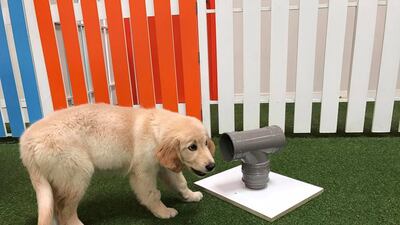DUBAI // The future of a puppy whose life depends on an urgent heart operation has become a little brighter after a clinic in England agreed to perform the surgery. But that depends on whether he can be safely flown to Britain.
Archie, a five-month-old golden retriever, has had a rare heart condition diagnosed by the British Veterinary Centre in Abu Dhabi. Cardiac imaging, more commonly used for humans, diagnosed a hole in the heart.
Operation and transport costs are likely to exceed Dh92,000 but Archie’s owner, Sean de la Harpe-Parker, a South African, is prepared to pay for the operation if he can persuade an airline to fly the puppy to Britain.
Archie needs constant oxygen during the flight but most airlines do not allow oxygen in the cabin, so Mr de la Harpe-Parker hopes that Archie can travel with racehorses in a special equine flight with Emirates.
“His condition is very rare and the UK clinic is one of the few places that uses human procedures in animals. Dogs there can be given open-heart bypass surgery,” he said.
“All animals must travel as cargo, but as he needs constant oxygen during the flight, that is not possible on most airlines.
“Emirates allow grooms on with horses, so we are hoping they will allow a doctor with Archie as cargo. It can be done but it needs a lot of people to realise the situation and agree to it.”
The surgery will take place at the Queen Mother Hospital for Animals in Hertfordshire.
Animals are not permitted in the cabin of Emirates flights, with the exception of falcons between Dubai and certain destinations in Pakistan, and guide dogs for the blind.
All other animals must be flown in cargo holds according to UAE Government regulations.
Archie has pulmonic stenosis and tricuspid dysplasia, abnormalities that restrict blood flow.
Mr de la Harpe-Parker has resorted to selling his possessions and taking out bank loans to pay for the treatment. Time is running out to find an airline willing to take Archie in time for the surgery on May 8. The next available Emirates equine flight is on April 29.
If Archie is unable to undergo the surgery, Mr de la Harpe-Parker has made the difficult decision to put down his beloved pet, who he rescued from an animal shelter weeks ago.
“Although he struggles to breathe, an oxygen supply makes it much easier for him,” said Mr de la Harpe-Parker, a manager at My Second Home, a pet hotel in Dubai Investments Park.
“Archie is constantly tired and struggling to breathe. It is not any kind of life for a puppy. We are at the knife edge right now.”
Although the surgery is risky, there is hope of success after a similar case in which Etihad flew a Labrador to and from Britain.
Dr Jose Botte diagnosed Archie’s condition by using the same cardiac imaging equipment used to assess human heart conditions.
“Archie is a very tricky case, and the only chance to survive is to have this surgery,” he said.
“It is an extremely rare pathology in dogs, and I had never seen it before. In the space of months I’ve seen two in the UAE.
“It takes a big commitment between the veterinary team and the human medical team. The surgery is unique and challenging.”
Ground-breaking open-heart surgery was first performed on a dog at the UK Royal Veterinary College in March last year. Dr Daniel Brockman operated on a three-year-old Labrador, Mabel, which had a similar heart failure.
“This is so rare in veterinary medicine, we don’t have the technology to do it alone,” Dr Botte said. “It is extremely unusual to see this crossover between human and animal medicine.”
nwebster@thenational.ae


